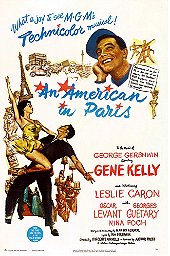While Singin’ in the Rain is easier to embrace and admire, 1951’s An American in Paris is the more coolly intellectual. It is the pop-sophisticate in comparison to its more extroverted sibling. The two films probably should not be compared too much as their aims are different, but they keep getting compared due to Gene Kelly’s starring in both, and that this one swept the Oscars while Singin’ was ignored.
The eternal comparison is not fair as An American in Paris offers plenty of its own exuberant and giddy thrills. After all, the individual ingredients include the strong songbook by George Gershwin, director Vincente Minnelli’s incandescent work, and Kelly’s wonderful choreography throughout culminating in a seventeen-minute ballet sequence that is among the most beautiful things to come out of any American musical. Hell, it is one of the most wondrous sequences to come out of cinema ever, coming damn close to rivaling the ballet in The Red Shoes.
I suppose it is easier to admire An American in Paris than warmly embrace it because it gives us a complicated ending. Yes, the lovers come together, but there are still several plot strands that are left open-ended. This is not typical of a big-budget musical of the era, which usually wrapped everything up by the final frame, sending our characters off to a happily-ever-after with a song-and-dance. No such satisfaction awaits us here, and I love it even more for it.
Not to say that An American in Paris is a complex narrative, it is not, it just does not play by the formula entirely. There are plenty of songbook musicals from the era, but they typical drape the songs across a thinly plotted, largely phony biography of the composer(s). There is also not a hint of a farm in need of saving, or a backstage drama. No “let’s put on a show” enthusiasm, just a tortured love quadrant in which heartbreak abounds and reunions feel bittersweet.
Post-WWII ennui has never looked so handsome as it does in the visage of Gene Kelly’s expat former veteran who now works as a painter on the Parisian streets. Normally Kelly was something of a glistening ham in scenes that asked him to play straight drama, but he is wonderful here. He believably sells his character’s conflicts, and he makes increasingly taxing and athletic dance moves like as simple as breathing.
The two women in his life are an interesting contrast. Nina Foch’s older, wealthy woman could be easily reduced to a possessive sugar-mama, but there is something sympathetic about her. A desperation to be loved, and a tendency towards looking for it in all the wrong places. Leslie Caron is a little hit-and-miss as an actress here, but her dancing easily places her in the upper pantheon of great cinematic ballerinas, standing easily alongside Cyd Charisse and Vera-Ellen. Caron’s introductory dance is a wonder of versatility as an artist. Watch as she uses her body to express carnality, domesticity, smarts, and playfulness, projecting any of these emotions with just a swivel of the hips or an extension of her leg.
Everything eventually builds up to the extended ballet, which rehashes the central love story as a trip through various art styles and famous French paintings. Minnelli gave the world many glorious Technicolor musical sequences, but this may be the apex of his work. The colors leap out at you, the costumes are flawless, and the production design necessary to recreate these famous works is untouchable. This scene alone is enough to place An American in Paris within the canon of great movies.
As entertaining as it is challenging, An American in Paris finds the Freed unit working at its optimal level. Minnelli and Kelly would make better films, or ones more beloved than this one, but that does not diminish the astounding artistry on display here. In fact, there is a reason this film won Kelly his Honorary Oscar, it has the audacity to dare greatly. And it makes the film that Minnelli would eventually win his directing Oscar for even more anemic in comparison.
 Login
Login